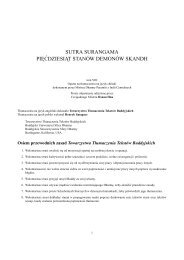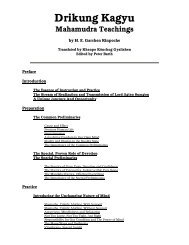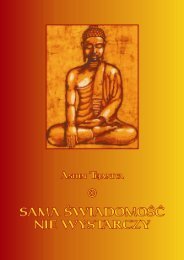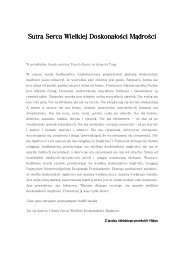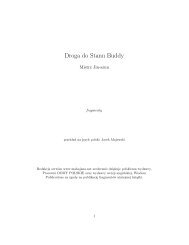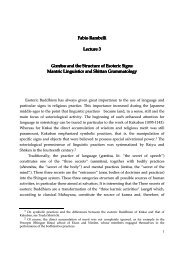My Zazen Sankyu (san = to participate humbly; kyu ... - Valley Zendo
My Zazen Sankyu (san = to participate humbly; kyu ... - Valley Zendo
My Zazen Sankyu (san = to participate humbly; kyu ... - Valley Zendo
You also want an ePaper? Increase the reach of your titles
YUMPU automatically turns print PDFs into web optimized ePapers that Google loves.
“hishi no ryo” - the substance of non-thinking<br />
There are many more. Of all his expressions the statement “zaso korin” (“zazen posture<br />
has descended from heaven”) most completely reveals his profound understanding of<br />
zazen.<br />
Yokoyama Roshi often spoke of the time when he was about 28 years old, before he was<br />
ordained a monk. He was sitting zazen alone in the mountains when a phea<strong>san</strong>t suddenly<br />
appeared. The phea<strong>san</strong>t s<strong>to</strong>pped and stared at him. Had he been standing the phea<strong>san</strong>t<br />
surely would have run away. But since he was sitting in zazen, the phea<strong>san</strong>t must not<br />
have been able <strong>to</strong> tell he was a human being, so the phea<strong>san</strong>t stared at him, perhaps<br />
pondering what he was. Yokoyama always said that from his "phea<strong>san</strong>t experience" he<br />
learned, intuitively, what shikantaza really is.<br />
His teacher, Kodo Sawaki Roshi, had a very similar experience when he was a young<br />
man. When Kodo Sawaki was seventeen years old, still a novice and not yet fully<br />
ordained, he was sent out <strong>to</strong> help perform a service at a nearby temple. He had only<br />
recently learned <strong>to</strong> sit zazen. And when he was finished with his ceremonial duties, he<br />
sat zazen alone in his room. Suddenly an old woman burst in<strong>to</strong> the room. This woman<br />
worked for the temple, supervising the work of the young novices, and she had a habit of<br />
driving this particular young monk very harshly. Assuming the room was empty she slid<br />
open the sliding door and burst in. As soon as she saw him sitting in full lotus, she<br />
pressed her hands <strong>to</strong>gether and bowed deeply before his zazen posture. She bowed more<br />
fervently than if she were bowing <strong>to</strong> a Buddha statue. She chanted Namu Shakamuni<br />
Butsu, Namu Shakamuni Butsu (Homage <strong>to</strong> Shakyamuni Buddha). Since the young<br />
novice had no academic training in Buddhism all, he had no theoretical understanding of<br />
what zazen was all about. Nevertheless this woman, who had been treating him like a<br />
slave every day, was now worshipping him as she would a Buddha.<br />
Sawaki Roshi said that this early experience of the sacred mystery of zazen posture was<br />
decisive in forming his lifelong faith in zazen. It is significant that both of these great<br />
Roshis, as young monks, before their formal ordination, had insight in<strong>to</strong> zazen posture as<br />
something that is beyond individual consciousness. Sawaki Roshi and Yokoyama Roshi<br />
both agreed that “The Buddha way is the faith that zazen posture is Buddha. When we<br />
refer <strong>to</strong> the qualities of hishiryo (beyond thinking) and munen muso (no thought, no<br />
image) we mean that sitting posture is beyond thinking and has no thought, no image, not<br />
that we ourselves are. We will never be beyond thinking, nor have no thought, no image,<br />
as long as we live. What we can do is sit with the faith that zazen posture itself is<br />
Buddha, that zazen posture itself is beyond thinking, with no thought, no image.<br />
Shikantaza is only concerned with zazen posture. <strong>Zazen</strong> posture is the supreme way for<br />
human beings <strong>to</strong> be.”<br />
Yokoyama Roshi's faith in zazen posture was extremely profound. He said "<strong>Zazen</strong> and<br />
the universe are congruent. It was zazen posture as the whole universe that descended <strong>to</strong><br />
the foothills of the Himalayas (where the Buddha was born), as if <strong>to</strong> say “This is the way<br />
I am.” Briefly we can say “zaso korin: zazen posture has descended from heaven. We



![Shushogi, Dogen Zenji [PDF] - Mahajana.net](https://img.yumpu.com/50921105/1/190x219/shushogi-dogen-zenji-pdf-mahajananet.jpg?quality=85)

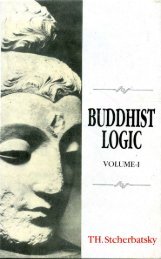
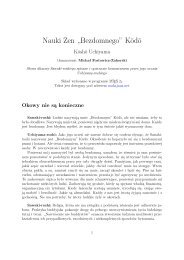
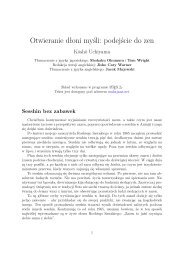
![wywiadu z Murakami Kosho Roshim [PDF] - Buddyzm w Polsce i na ...](https://img.yumpu.com/45809746/1/184x260/wywiadu-z-murakami-kosho-roshim-pdf-buddyzm-w-polsce-i-na-.jpg?quality=85)


